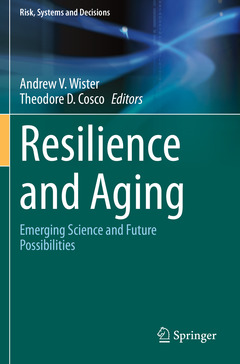Description
Resilience and Aging, 1st ed. 2020
Emerging Science and Future Possibilities
Risk, Systems and Decisions Series
Language: English
Subjects for Resilience and Aging:
Keywords
Publication date: 01-2022
275 p. · 15.5x23.5 cm · Paperback
Publication date: 01-2021
275 p. · 15.5x23.5 cm · Hardback
Description
/li>Contents
/li>Biography
/li>Comment
/li>
Chapter 1: Introduction: Perspectives of Resilience and Aging.- Chapter 2: Resilience in Older Adults: What it is and How to Strengthen It.- Chapter 3: Resilience in Later life: Responding to Criticisms and Applying New Knowledge to the Experience of Dementia.- Chapter 4: Science and Practice of Resilience: Disaster Systems Applications to Aging Model Development.- Chapter 5: Multimorbidity Resilience: Conceptual, Theoretical and Measurement Developments.- Chapter 6: Quantitative Approaches to Examine Resilience and Aging.- Chapter 7: Positive Affect as Source of Resilience in Adulthood and Later Life.- Chapter 8: Psychological Resilience in the Face of Later-Life Bereavement.- Chapter 9: Physical Resilience and Aging.- Chapter 10: Mobility Resilience Processes Among Older Adults.- Chapter 11: Communities and Resilience: Contextual and Collective Resilience.- Chapter 12: Advancing the Concept of Resilience for Older Adultswho are Experiencing Homelessness.
Theodore D. Cosco, PhD began volunteering at age 12 at a long-term care facility, beginning what would become a life-long passion for gerontology and the aging process. Using both qualitative and quantitative approaches, Dr. Cosco examines a range of factors that promote healthy aging and resilience in older adults, from digital interventions to physical activity. He is an Assistant Professorship in the Department of Gerontology, Simon Fraser University and is a Research Fellow at the Oxford Institute of Population Ageing, University of Oxford. Dr. Cosco is a Chartered Psychologist (British Psychological Society) trained in applied social research methods (MSc, Trinity College Dublin), and epidemiology (PhD, University of Cambridge). Recently, he r




